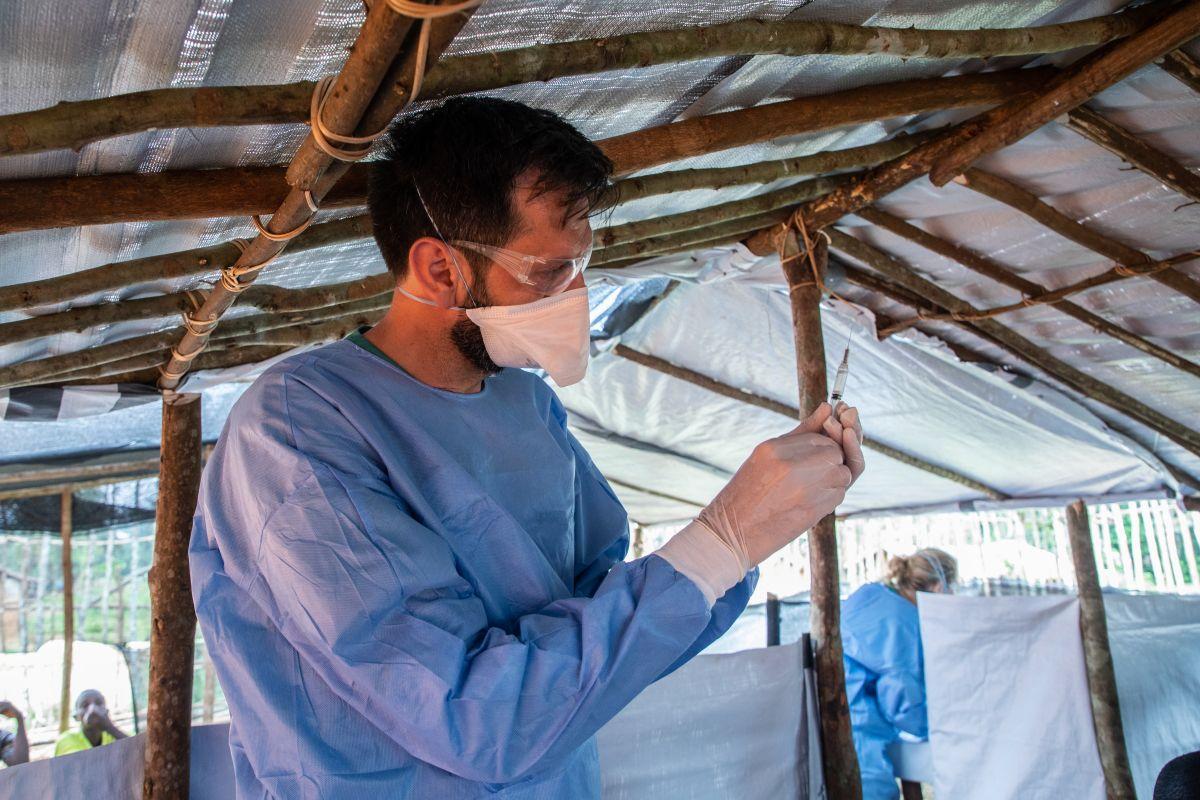Médecins Sans Frontières/Doctors Without Borders (MSF) yesterday started vaccinating Ebola frontline workers in Bikoro, Equateur Province, Democratic Republic of Congo (DRC), where teams have been working with the Ministry of Health and the World Health Organization (WHO) over the past few weeks. The trial vaccination will also be offered to contacts of patients.
The Ebola vaccine (rVSVDG-ZEBOV-GP) is being used as part of the overall strategy to control the Ebola outbreak. This investigational vaccine has not yet been licensed and is being implemented through a study protocol, which has been accepted by national authorities and the Ethical Review Board in Kinshasa, as well as MSF’s Ethical Review Board. The protocol defines to whom, when and how the vaccine should be given.
Participants receive information on the vaccine before consenting, and will be carefully monitored over a period of time. Participation is voluntary and the vaccine is free.
A ‘ring’ vaccination
The vaccination will be administered using a ‘ring’ approach. This involves identifying newly diagnosed and laboratory-confirmed Ebola patients and locating the people they have been in contact with. These people and their contacts — often family members, neighbours, colleagues and friends of the patient — will constitute the ‘ring’. Ebola health workers in the affected area will also be offered the possibility of vaccination, as they are most at risk of exposure to the virus and developing the disease.
Ring vaccination ensures that the vaccination of people who are in the ‘ring’ create a buffer zone — or protective ring — to prevent the spread of infection.
In collaboration with the Ministry of Health, WHO and other agencies, MSF and our epidemiological research arm Epicentre were involved in vaccine trials in Conakry, Guinea at the end of the Ebola outbreak in 2015.
“Based on the results of the past trials we are confident in using the vaccine for this current outbreak. Given that it has not yet been licensed, we will be closely monitoring the vaccination,” said says Dr Micaela Serafini, Medical Director of MSF in Geneva. “The results of the trial suggest that the vaccine will present a real benefit to people at high risk of contracting Ebola, protecting them against the infection. However, vaccination remains just one additional tool in the fight against the disease. Identifying patients and contacts is the first step.”
People who are vaccinated continue to follow the same infection control protocols as in previous outbreaks and Ebola health workers will continue wearing protective equipment. The pillars of responding to an Ebola intervention must continue in order to stem the spread of the disease:
-Providing medical and psychological care, and isolating people who are sick;
-Outreach activities including tracing and following up contacts;
-Informing people about the disease, how to prevent it and where to seek care;
-Supporting existing healthcare structures; and
-Temporarily adapting cultural behaviour, such as funeral rituals.
MSF teams in the field
The current outbreak was declared on 8 May, in the northwest of the country. As of 28 May, there had been 35 confirmed cases of Ebola resulting in 12 deaths, according to figures from DRC’s Ministry of Health. MSF teams are working in four places to take care of patients and to stem the epidemic.
MSF teams are currently in the areas of Mbandaka and Bikoro, where they have put in place two Ebola Treatment Centres (ETCs), with 12 and 20 beds, respectively. Teams are also tracing people who have been in direct or indirect contact with confirmed Ebola cases. In parallel, they are trying to raise awareness with communities to limit exposure to the disease and encourage safe burial practices.
There are also MSF teams working in the remote areas of Itipo and Iboko. A transit centre with 10 beds has been set up in Itipo, where people suspected of having Ebola are isolated and receive care while waiting for laboratory diagnosis. If they test positive for the virus, they are transferred to the Bikoro ETC. In Iboko, an isolation area has been set up in the hospital and the team is building a new ETC.
Some of MSF’s most experienced Ebola field workers, including medical personnel, experts in infection control, and logisticians, are on the ground in Equateur Province, responding to the outbreak.
